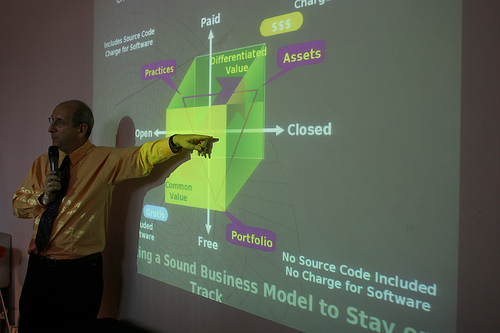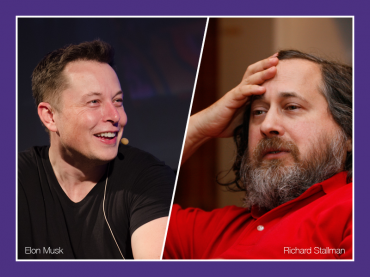Michel Bauwens is a peer-to-peer theorist, author and speaker on technological and cultural innovation. For him, we have already started to see evidence of a space which exists for open business models.
“This article is an excerpt of the book Open models published in French in 2014 and translated in 2016”
What are the most striking examples of free initiatives ?
There are two sectors for which we have significant hindsight: software and open manufacturing with Arduino. In the case of open software, Linux and Ubuntu are good examples which clearly outline the questions of the contribution economy. Three quarters of individuals working on the core of Linux are full-time employees elsewhere. In these systems, commons is built by volunteers, very few employees, and the contribution of some companies. We can see that only few voluntary contributors live exclusively off their involvement. We find the same situation again in the Arduino ecosystem, albeit with one difference about the commons. Indeed, in open software, there are commons institutions, non-profit organizations protecting infrastructures, viability and production and diffusion (Linux, Wikimedia or Bitcoin foundations, by example). In open hardware, dependency on companies is more important. This is probably due to the material dimension of the product, which greatly increases production costs. There, commons institutions are less numerous, or at times even absent.
In these examples, how are contributors remunerated ?
This is the precisely the problem. They do not find remuneration directly via their involvement in the production of commons. Individuals have to join the market economy to be able to provide for themselves. We need intermediate structures between foundations and companies. For now, those intermediate structures do not yet exist. We could imagine cooperative organizations linked to structures in charge of the construction of commons. It is today my priority to find and precisely describe which type of entities these could be. The fundamental problem is the tension between the need for scarcity in the market economy and the abundance created by digital technology. Companies base part of their economy on scarcity, which is inconsistent with the commons logic. Some initiatives try to go beyond this opposition, like GCoop in Argentina and OS Alliance in Austria. Wikispeed (open source car, ed.) is another interesting example: they refuse venture capital funding to keep control of their work and their independence. Extreme-manufacturing methods developed (and which are close to agile methods from software) are also particularly interesting. Always in open manufacturing, Open Tech Forever is a cooperative developing open agricultural machines. Finally, Protei, with the open project H2O, is the example of a project with a very strong scientific dimension, with an open license, while looking for a sustainable business model.
“Companies base part of their economy on scarcity, which is inconsistent with the commons logic.”
When we design a product for the market, the logic is scarcity, just like planned obsolescence. Instead, if a community designs a product, we naturally head towards a more sustainable path.
If the market is not suitable for the construction of the commons and if individuals cannot provide for themselves when being involved in it, what is the solution ?
We can say that technologies we consider crucial for the future, for example those linked to new energies, must not be privatized. They must be a commons (possibly protected by Government). Recent events have shown us that, in the specific case of energy, energy and car-manufacturing companies and associated lobbies implemented strategies to delay the arrival of new disruptive technologies as much as possible and this, ironically, thanks to patents (see Who killed the electric car ?, Chris Paine, 2006). Instead of promoting the spreading of these innovations, patents indirectly contribute to limit their spread when private capital bought patent portfolios and companies which owned them in order to prevent the spread of these technologies. In health care, the two examples of polio and AIDS, give us a similar demonstration in that when technologies are protected, they spread much slower than when available and open.
Which business models work ?
As we don’t monetize the commons, whether it be software or product design, we monetize the peripheral services. The peripheral services path is the most successful thus far. But it raises one concern, namely investment funding. Indeed, our economy is based on debt. Yet, the production of a commons does not generate ongoing remuneration, therefore it does not interest the majority of investors. Initiatives by commons investors are emerging like the Open Venture Movement (Hub Launchpad, London) or Ability Capital (Melbourne, Australia) which fund open projects. These investors accept to earn slightly less economic value to create substantially more social value. They have a wide, long term vision of capital, not only economic, but also social and cultural. In Ecuador, the government declared itself ready for a transition toward an open knowledge society based on commons. Making investments in open projects is a way to engage this transition. It is also in this context that I am presently in this country where I work as Head of Research.
What needs to be leveraged in order to foster these open models ?
First, we have to foster commons production practices. Open access and open science are examples going in this direction. We also need a strong legislative framework supporting open production. There are also important material conditions, as for example universal access to broadband and creation of small plant networks linked to open design communities. Intangible conditions are also required. We need an open system of knowledge qualification (especially for PhDs) and systems of validation and legitimization of produced knowledge. Finally, new management methods like open value accounting would enable us to identify, value and reward contributions. This question of valuing individual contribution is not simple. We know now that if we establish too direct a link between contribution and compensation, we impact the behavior of contributors, who will start to produce with a market logic instead of a commons logic. Sensorica is working on a financial remuneration system for contribution which dissociates earnings and contribution: each contribution is assessed by peers, which determines an individual rating. Then, money is possibly collected and distributed according to this rating. In this system, contributions are not technically goods. More fundamentally, we need to redefine the way we create and share value.
How do we achieve this ?
We know we are able to exponentially increase the use value, and we know that at the same time economic value only grows in a linear manner. This is a problem. Facebook perfectly illustrates this phenomenon. The issue is one of capturing the economic value. The platform captures all the value. Nothing goes back to individuals who build this value. We reach a paradox in that peer-to-peer systems demonstrate a far more important productivity than merchant or hierarchical ones, and this productivity gain is captured by a comparatively small number of actors who have placed themselves in a central position. In models we try to promote, those who contribute to the commons should be those who capture more of the value at the end. We want to create a business model which restores the link between value creation and value capture.
Interview by Karine Durand-Garçon.
Translation by Anne-Sophie Payen with the help of Antoine Martin-Regniault





